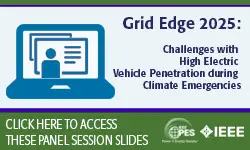Digital Twins for Electric Utilities: Definition, Considerations, and Applications (TR122)
Abder Elandaloussi; Alyona Teyber; Eric Davis; Esen Kacar; Genevieve Lietz; Gerald Gray; Mayank Malik; Maziar Isapour
-
Members: FreePES
IEEE Members: $45.00
Non-members: $70.00Pages/Slides: 55
The electric utility sector has and will continue to face challenges from managing a dynamic grid that is constantly evolving, as fast change makes the grid less predictable. The unpredictability of every aspect of the grid arises from the emergence of a portfolio of assets that consumers demand and need to improve their quality of life and also contribute to the global decarbonization and sustainability efforts. Such assets may include consumer appliances, consumer electronics, inverter-based resources (IBR), and EVs; these are only a few examples of agents/nodes in the grid that may be unpredictable either in consumption or generation behavior. The larger challenge is the upcoming nodes/agents that are out of utility’s control and will be interconnected in the future, as various industries innovate to meet evolving customer demands. From another angle, climate change is creating complexities in grid management since events related to the climate are evolving and becoming less predictable. Utilities are experiencing climate events that are abnormal to their specific geographic area; with this, they have not historically been planned for. Finally, the aging infrastructure is causing challenges in efficiently managing the grid to achieve all utility key performance metrics. These various factors are examples of the change in the DNA of the grid and its environment. Many of these rapid changes are happening in parallel, whereas existing utility processes and tools were developed based on the historical DNA of a grid which was more static, with perhaps DERs being the only key source of unpredictability. These concurrent challenges drive the question that the industry is asking: How do we keep up with such changes, knowing that new phenomena in climate, customer adoption of new technologies, and evolving utility asset defects could arise?


